WORLD NO : 3 STUDY ABROAD DESTINATION
Wish to Study in UK
"Get free 60-Minutes Counseling"
@ TEC
Discover all you need to know about studying in UK.
Book a counseling session now!
Connect with a UK Counselor Today
Fill out this form for booking a consultant advising session.
Wish To
Study in UK?
But Not Sure
Where To Begin?
Book a Free "60-min Counseling" from our Expert UK Counsellor
Discover all you need to know about studying in UK.
Book a counseling session now!
Connect with a UK Counselor Today
Fill out this form for booking a consultant advising session.

A Comprehensive guide into Study in UK
Why Choose to
Study in United Kingdom
Details on Studying Abroad | Qualifications Needed | Financial Breakdown | Available Courses and Opportunities | Job Prospects
Study in UK
The United Kingdom stands out as a premier destination for studying abroad, boasting over 150 renowned universities that bolster students' academic and professional trajectories. Annually, a multitude of students from around the globe enroll in various programs such as MBA, Engineering, 1-Year Master's, and Nursing in the UK. Official statistics from the UK Government indicate a significant growth in higher education enrollees, with numbers soaring to 433,102 in March 2023 from 222,047 in September 2019. Additionally, there was a 22% increase in the number of study visas issued, totaling 477,931 by the year ending March 2022.
In the academic year 2021-22, approximately 679,970 international students from more than 100 countries were pursuing their education in UK universities. This cohort included 120,140 students from EU countries and 559,825 from non-EU nations. Notably, the Ministry of External Affairs reports that in 2022, around 55,465 Indian students were engaged in studies across the UK. If you're earnestly considering the UK for your studies, delve into this guide to discover essential information on top universities and courses, visa prerequisites, educational expenses, scholarships, intake periods for 2023, and more, to embark on your UK education journey.
Why Study in UK?
The allure of studying in the UK lies in its world-renowned universities, cutting-edge research facilities, diverse international community, and deep cultural heritage, all of which combine to make it an esteemed destination for higher education. For international students, opting for the UK is a wise decision, given its outstanding educational standards and storied tradition of academic excellence. The nation is home to enchanting cities such as Edinburgh, Manchester, Birmingham, and Glasgow, each offering its own unique blend of history and modernity. Additionally, the UK boasts several globally acclaimed universities, including the University of Oxford, University of Cambridge, Imperial College London, and University College London, known for their high-ranking positions and exceptional academic programs.
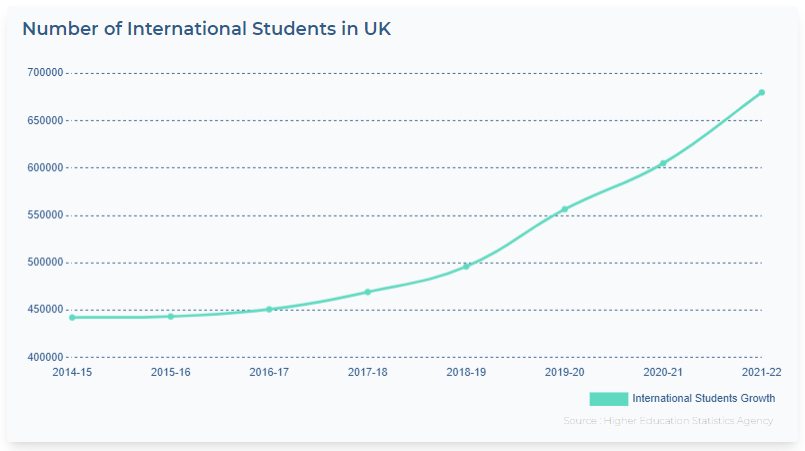
Study in UK: Key Facts & Statistics
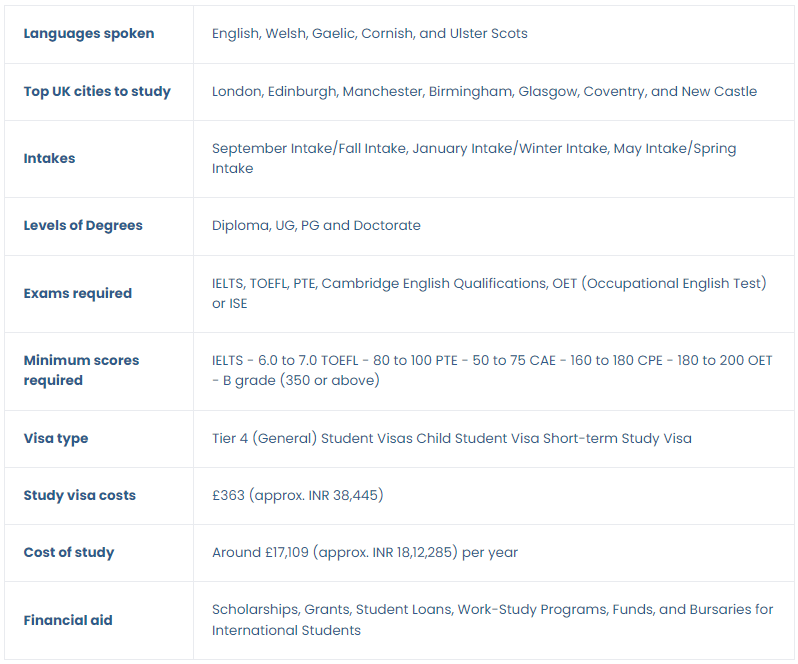
The information provided indicates that to study in the UK, students must maintain strong academic records, demonstrate English language proficiency, apply for a Tier 4 (General) Student Visa, and cover a visa fee of £363.
The UK stands out among English-speaking nations as a welcoming, secure, and congenial place for international students, offering a supportive environment conducive to learning and personal development. Indian students, in particular, favor the UK for their overseas studies, attracted by the high-quality education and globally acknowledged degrees that UK universities offer.
These institutions are celebrated for their outstanding academic standards, innovative teaching methods, and a pronounced focus on research. With a broad spectrum of programs ranging from Business Management and Engineering to Arts, Medicine, and Environmental Studies, the UK enables students to find courses that best match their aspirations and career objectives.
Top 10 Benefits of Studying in UK
The UK's education system is renowned for its excellence and diverse higher education and career opportunities. With over 100 government-funded and private universities, international students can choose from a range of programs including diplomas, certificates, bachelor’s, master’s degrees, and specialized courses. One of the unique aspects of UK education is the availability of diploma degrees and 1-year master's programs, designed to be intensive and in-depth, allowing for quicker integration into the UK job market.
Affordability and Streamlined Visa Process: The UK's Student Direct Stream (SDS) offers a streamlined visa application process and various cost-effective study options.
Post-Study Work Opportunities: The UK’s new Graduate Route allows international graduates to work for up to two years post-study, providing valuable career experience.
Language Proficiency: Studying in an English-speaking environment enhances language skills, offering a competitive advantage globally.
Scholarships for Indian Students: Scholarships like the Chevening and GREAT Scholarships are specifically available to Indian students, aiding their educational journey in the UK.
Research Excellence: The UK's research-driven universities offer Indian students opportunities to engage in groundbreaking research across multiple disciplines.
World-Class Universities: Institutions like Oxford, Cambridge, Imperial College London, and UCL provide top-tier education, with many ranked in the QS World University Rankings 2023.
UK Government Scholarships: There are over 80 scholarships and financial aids for international students, fostering educational and cultural exchange.
Extensive Alumni Networks: The UK's vast alumni network provides Indian students with valuable connections and networking opportunities throughout their careers.
Personal and Cultural Growth: Immersing in the UK's multicultural environment fosters personal growth, independence, and adaptability.
Globally Acknowledged Education: The UK’s education system is globally acclaimed, offering students a strong foundation for their future endeavors
Best Places to Study in UK
Understanding the top student cities in the UK is essential for an enriched educational experience, blending cultural vibrancy with academic prowess. Cities like London, Edinburgh, and Manchester offer a comprehensive array of opportunities. Delve into the distinct characteristics and academic offerings of each to find your ideal study location in the UK.
-
Oxford: Situated in South East England, Oxford is celebrated for its historic ambiance and 'the City of Dreaming Spires' nickname, reflecting its esteemed universities and stunning architecture. Average annual course fees for UK students are £9,250 for 2023-24.
-
London: England's capital, London, is a cosmopolitan hub hosting renowned institutions like Imperial College London and UCL, with tuition fees ranging from £9,250 to £67,892 per year.
-
Liverpool: Known for its maritime heritage and cultural landmarks, Liverpool's tuition fees vary between £21,000 and £40,000 annually.
-
Bath: Famous for its Roman baths and Georgian architecture, Bath's universities focus on disciplines like engineering and social sciences, with fees from £3,120 to £37,500 a year.
-
Birmingham: This diverse city in the West Midlands offers a dynamic cultural scene, with tuition fees averaging between £9,800 and £19,200 annually.
-
Edinburgh: Scotland's capital, known for its historic and cultural sites, has tuition fees around £29,000 per year.
-
Glasgow: Scotland's largest city offers a vibrant arts and music scene, with tuition costs between £6,800 and £53,460 annually.
-
Newcastle upon Tyne: This northeastern city, known for its lively atmosphere and rich history, has tuition fees ranging from £19,200 to £24,300 per year.
-
Wales: Celebrated for its festivals and Cardiff Castle, universities in Wales have fees ranging from £12,000 to £22,000 annually.
-
Manchester: With a notable music scene and industrial heritage, Manchester's universities charge between £12,200 and £44,800 per year.
-
Coventry: Home to two prominent universities, this city is known for its history and innovation, with tuition fees typically between £20,050 and £24,050 per year.
Each city offers a unique blend of educational excellence and cultural richness, catering to a wide spectrum of interests and academic pursuits.
How to Study in UK?
Adhering to these guidelines is crucial for a seamless and fruitful journey towards pursuing education in the UK. The steps outlined below are designed to streamline the process for prospective students aiming to study in the UK.
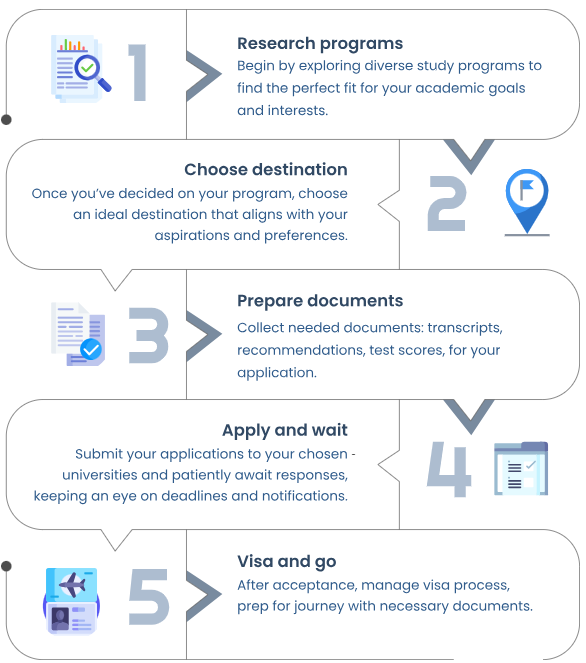
Intakes to Study in UK
Understanding the study intake periods in UK universities is crucial for international students, as these timeframes influence application deadlines, course options, and the timing for visa procedures. The UK typically has three primary intakes: September (Fall), January (Winter), and May (Spring), with each serving distinct purposes and offering different advantages.
-
September Intake: Often considered the primary intake, the September or Fall intake coincides with the commencement of the academic year. This intake offers the widest variety of courses, along with extensive opportunities for internships, employment, and networking, making it the most popular choice among students.
-
January Intake: The January or Winter intake serves as an alternate starting point for those who may have missed the September intake or prefer to commence their studies at the beginning of a new calendar year. While the selection of courses might be more limited than in September, this intake offers a chance to engage in less crowded programs.
-
May Intake: Known as the Spring intake, May offers fewer course options and is generally less favored compared to the other intakes. However, it provides an excellent opportunity for students looking for specialized programs or those with unique timing needs in their academic plans
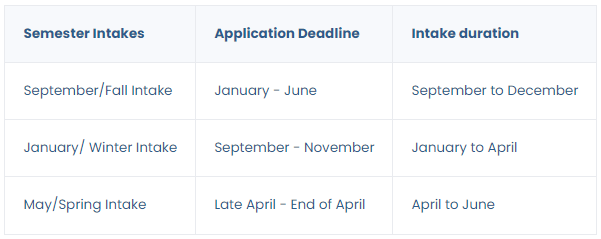
Popular Courses to Study in UK
UK's leading universities emphasize experiential learning within their educational methodologies, engaging students in practical, real-world applications of their studies. Students have the liberty to select from an array of courses across various fields like Business, Engineering, Computer Science, Medicine, Data Science, Artificial Intelligence, Cybersecurity, Social Sciences, and Arts. They offer three primary degree levels: Bachelor’s, Master’s, and Doctoral research programs. Below is a curated list of in-demand courses that align with global industry needs:
- Business Management and Entrepreneurship
- Medicine
- Law
- Social Sciences
- Media and Communication
- Data Science and Analytics
- Artificial Intelligence and Machine Learning
- Cybersecurity and Information Security
- Nursing and Healthcare Management
- Biomedical Science and Bioinformatics
- Public Health and Epidemiology
- Digital Marketing and Communications
- Engineering and Technology
- Finance and Accounting
- Hospitality and Tourism Management
- Architecture and Urban Planning
These courses are among the most sought-after by international students in the UK, reflecting the current trends and demands in various sectors. The following table presents the top courses available for international students in the UK, along with the average annual tuition fees.
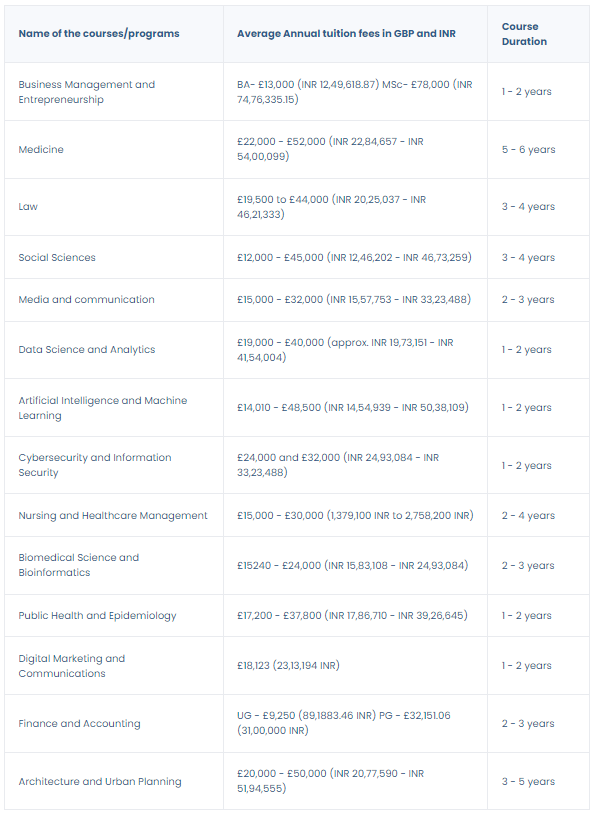
Top Universities to Study in UK
Prospective students seeking to study abroad will find exceptional academic standards at the UK's premier universities. These esteemed institutions provide an ideal environment for students eager to immerse themselves in a storied academic tradition, learn from seasoned professors, guest lecturers, and industry experts, and collaborate with peers from across the globe. Whether their interests lie in the arts, sciences, technology, or business, UK universities deliver an educational experience that can profoundly influence their future.
Below is a table showcasing prominent UK universities, accompanied by their rankings in the QS World University Rankings 2023 and the Times Higher Education (THE) Rankings 2023:
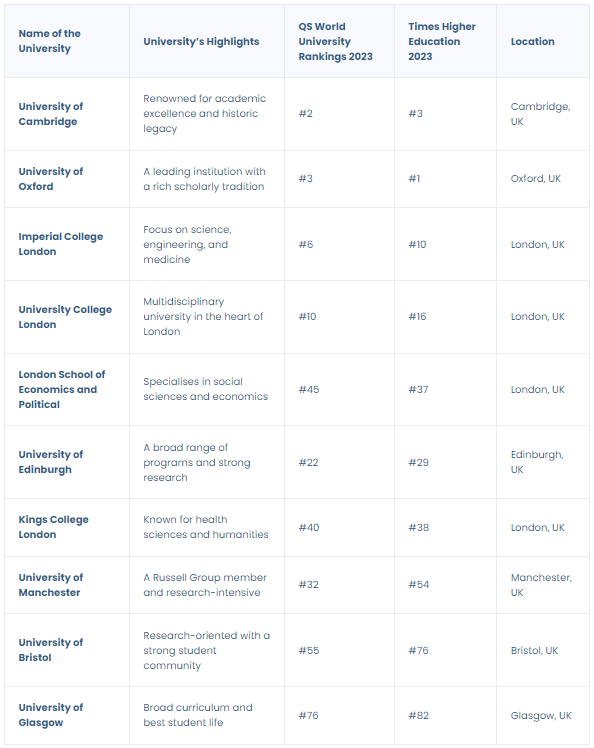
UK Student Visa Requirements
To pursue studies in the UK, candidates require a UK Student Visa, also referred to as the Tier 4 Visa, for full-time study programs. For shorter courses, a Visitor Visa may be necessary. Visa decisions typically arrive within 3 weeks, making early application crucial. The application fee for a UK study visa is £363 (approximately INR 38,507) when applying from outside the UK. This visa falls under the Points-Based System (PBS), a framework the UK government uses for immigration management. For detailed information on student visas or study permits, it's advised to consult the UK government's official website or contact the nearest British embassy or consulate.
Student Visa Requirements for UK
For a successful UK study visa application, you'll need the following documents:
- A valid passport.
- Your Confirmation of Acceptance for Studies (CAS) from the educational institution.
- Passport-sized photographs.
- Academic transcripts to verify your educational background.
- An ATAS certificate, if required for your course.
- If you're under 18, documentation of parental or legal guardian consent is needed, along with proof of your relationship to them.
- Results of a tuberculosis test, if applicable.
- If you've been financially sponsored in the last 12 months, you need written authorization from your sponsor.
- Evidence of sufficient funds to cover your course fees and living expenses, which is recommended to be £1,334 per month if you're studying in London or £1,023 per month if you're outside London, for up to 9 months.
- For language proficiency, achieve a score equivalent to CEFR level B2 if you're enrolling in a degree-level course or higher, or CEFR level B1 for courses below degree level.
When applying from outside the UK, you'll also need to:
- Prove your identity and provide biometric information, including fingerprints and a photograph.
- Use the ‘UK Immigration: ID Check’ app to verify your identity documents, or have them scanned.
- Create or sign into your UK Visas and Immigration (UKVI) account to proceed with your application.
Scholarships to Study in UK Universities
In the UK, scholarships serve as financial awards granted to students who meet specific eligibility criteria, helping to subsidize their educational expenses. These scholarships vary in amount and requirements, depending on the issuing body, which can be the UK government, universities, private entities, or international organizations. To foster international academic exchanges, the UK provides specific scholarships for Indian students, encouraging them to pursue their studies in the UK. Students are encouraged to diligently search and apply for scholarships that match their academic accomplishments, area of study, and financial necessities.
Explore the array of distinguished scholarships available for international students wishing to study in the UK.
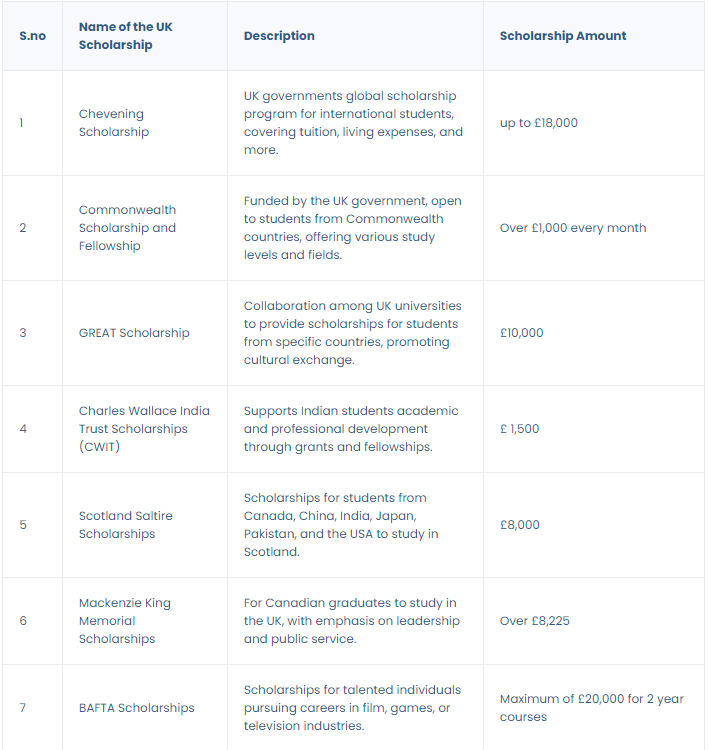
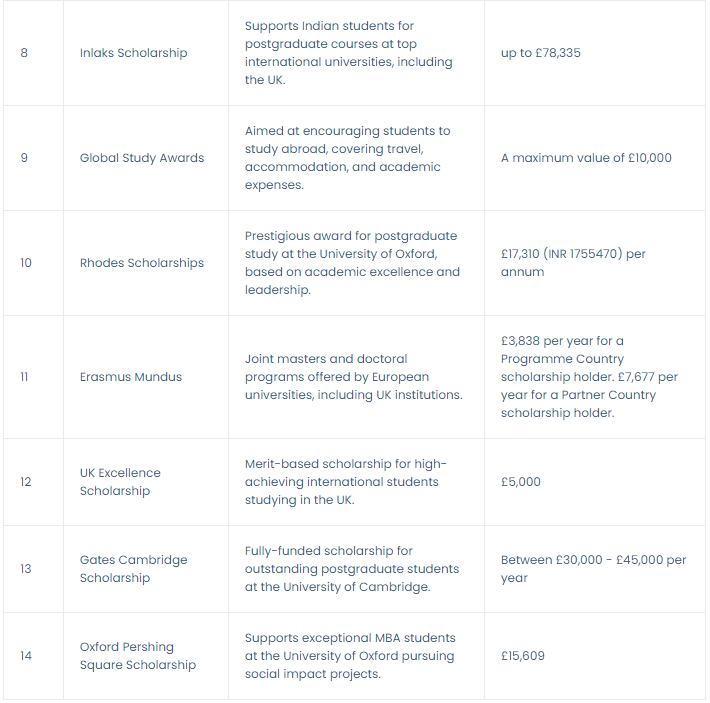
Education Loan for Studying in UK
Navigating the financial aspects of studying in the UK can be challenging, but education loans from both governmental and private lenders offer a viable solution. To qualify for an education loan, students typically need to demonstrate strong academic performance, secure admission to a recognized UK university, and have a guarantor or co-signer. Financial institutions like the State Bank of India, Syndicate Bank, and Bank of Baroda offer various loan options for overseas education. Once students obtain an acceptance letter from a renowned university, the loan approval process generally accelerates.
The following are typical expenses covered by education loans for students in the UK:
- Tuition fees
- Accommodation costs, including rent and utilities
- Travel expenses, including airfare and local transportation
- Study materials, such as books, supplies, and equipment
- Living expenses, covering food and personal costs
- Health insurance
- Visa application fees
- Examination fees for tests like IELTS and TOEFL
- Research-related expenses
- Costs associated with academic events like workshops and seminars
- Expenses related to placements and internships
- Other miscellaneous costs
Cost of living in UK
The typical annual cost of living in the UK is approximately £12,000, which equates to around 12,56,397 Indian Rupees. This estimate covers essential expenses such as housing, utilities, transport, food, and recreational activities. Life in the UK, particularly in major cities like London, Edinburgh, and Manchester, can be costly. However, students benefit from the National Health Service (NHS), which provides free healthcare, offering a significant financial
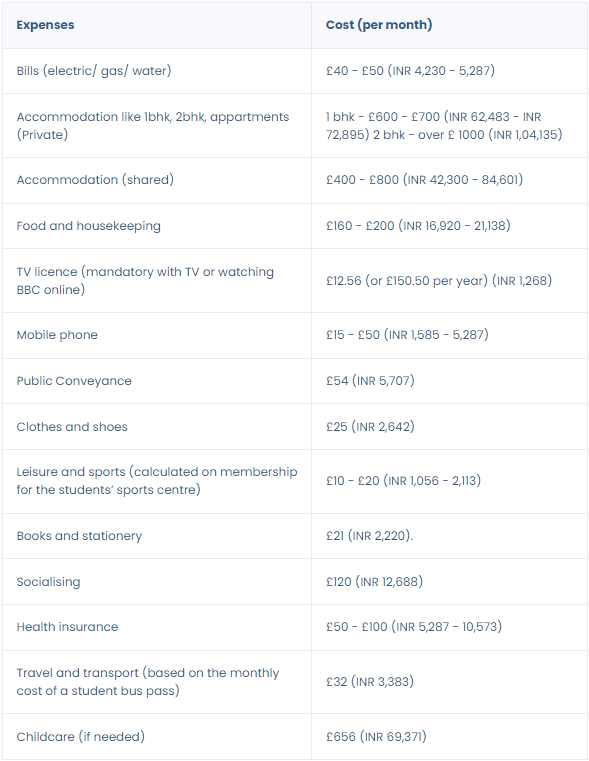
Post-Study Work Opportunities in UK for International Students
The UK offers valuable post-study work opportunities for international students via the Graduate Route Visa, allowing them to stay and work in the country for 2 years post-graduation, or 3 years for doctoral graduates. The National Living Wage increase has boosted the average hourly wage to £10.42 for international students in the UK. To secure a UK Graduate Route Visa, students must cover a £715 application fee and a £624 yearly health surcharge, opening doors to invaluable work experience and employment prospects. Upon visa expiration, graduates can transition to skilled work visas, such as the Tier 2 visa, to further their careers in the UK.
Applicants for the UK's Graduate Route open work permit need to provide these documents:
- A valid passport
- Biometric Residence Permit (BRP)
- Confirmation of Award or Certificate of Qualification
- Tuberculosis (TB) test results, if required
- Evidence of financial means to support themselves
- Receipt for the health surcharge payment
- Passport-sized photographs
Below is a table detailing various job roles along with their average yearly salaries in both GBP and INR.
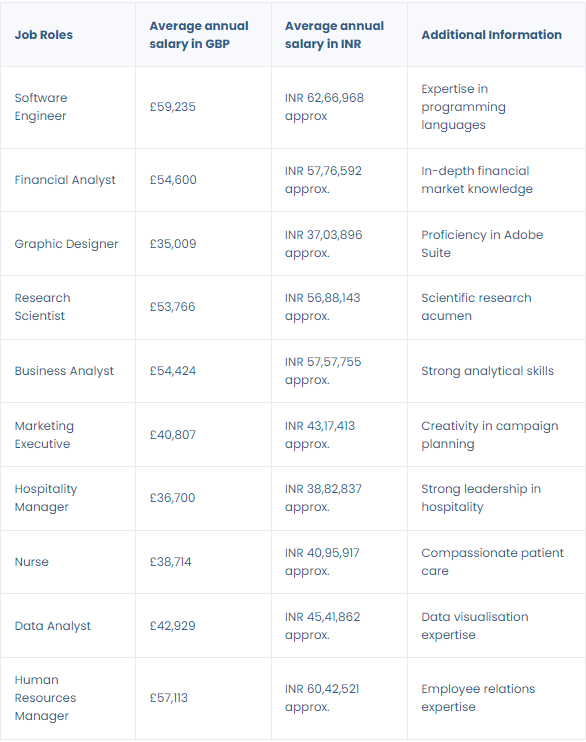


Get a Free 60-Min Counselling Session
Explore options for destinations, courses, and college choices with expert guidance!
Additional Assistance - Education Loan | Travel Insurance | Air Ticketing | Visitor Visa

Thanks to the expert IELTS training, I achieved my dream score! The personalized attention and detailed resources made all the difference. Truly grateful!
Dhrupal
Broadcasting Performance & Digital Media Course, Canada.

As a non-native English speaker, I was nervous about IELTS. This program's patient guidance and strategic approach helped me succeed beyond expectations.
Dhwani Solanki
6.5 + Band Score in IELTS is First Attempt Algonquin college, Canada.

Their teaching method is exceptional! I improved dramatically in just a few months. Thank you for turning my study abroad dreams into reality!
Freya Joshi
Early Childhood Education, Georgian College

"The quality of IELTS training here is unmatched. The instructors' expertise and supportive environment were key to my high score. Highly recommend!"
Devanshu
Cleared IELTS in 1st Attempt,Yorkville University, Ontario Canada

The English Channel is the best I have ever seen. This premises has been helping students who want to pursue their dream of studying in any other nation. Teachers have totally different ways of teaching, which is a practical way to get the desired band score.
Sneh Prajapati
Studying in Canada

TESTIMONIALS
Happy Cases, Happy Faces!
With over 8 years of IELTS training experience and 750+ students helped, we're dedicated to realizing your academic and professional dreams.
Frequently Asked Questions on
Study in UK
The expenses associated with pursuing education in the UK can fluctuate based on several elements including the selected institution, program, and geographical area. Typically, the tuition fees for undergraduate programs range from £10,000 to £30,000 annually. For postgraduate studies, the costs can vary from £10,000 to £40,000 each year.
Yes, the majority of universities in the UK necessitate that international students demonstrate their proficiency in the English language, with the IELTS being a commonly accepted certification. Nonetheless, various institutions may also recognize alternative examinations such as TOEFL, PTE, Duolingo, or Cambridge English assessments for this requirement.
Studying in the UK might be more expensive than in some countries yet more affordable than in the US. Despite the higher tuition fees and living costs, the exceptional quality of education and the esteemed value of UK degrees are significant advantages. To mitigate these expenses, students can explore a variety of scholarships, grants, and part-time employment opportunities.
If you're from India and planning to pursue your studies in the UK, here's a step-by-step guide to follow:
Begin by researching universities and programs in the UK that align with your interests and academic background.
Proceed to apply to the chosen universities, ensuring to include necessary documents like academic records, a personal statement, relevant test scores (SAT, GMAT, GRE, etc., depending on the program), proof of English language proficiency (IELTS, TOEFL, PTE, etc.), and references.
Apply for a Tier 4 (General) student visa through the UK Visa Application Centre in India. Demonstrate that you have adequate funds to support your tuition fees and living expenses while in the UK.
Secure comprehensive health insurance coverage. Organize your travel and accommodation in the UK.
Certainly, after finishing your 12th-grade education in India, you're eligible to apply for undergraduate programs in the UK. Numerous universities there provide a diverse range of bachelor's degree courses. Typically, UK universities look for applicants with high school grades between 50-60% and proficient English language skills for admission.
Upon finishing your studies in the UK, you might qualify for a post-study work visa or explore other pathways that could pave the way to permanent residency. The specific requirements and procedure will hinge on the prevailing immigration rules when you complete your education. Typically, securing an employment offer in a qualified role, achieving certain salary benchmarks, and satisfying residency stipulations are essential steps in this process.
The most common English language proficiency exam required for studying in the UK is the International English Language Testing System (IELTS). Other accepted tests might include TOEFL, PTE, Duolingo or Cambridge English qualifications. Additionally, for some courses, you might need to take standardized tests like the SAT, ACT, or subject-specific tests.
The main intakes for studying in the UK are typically in September. The September intake aligns with the academic calendar, and a larger number of courses are available
While its less common to find 100% funded scholarships for international students in the UK, there are various scholarships, grants, and financial aid options available. Some scholarships can cover tuition fees partially, and others might include living expenses.
Individuals who are 16 years old or older are eligible to apply for a UK Student visa to pursue further or higher education. Applicants must have an offer of acceptance from a recognized UK educational institution, valid English language proficiency test results (such as IELTS), and evidence of sufficient funds. This means demonstrating around £1,334 per month for up to nine months for courses in London, or £1,023 per month for the same duration for courses outside London. Additionally, securing a licensed Tier 4 sponsor is essential for the visa application process.
-
Research Phase: Start by collecting detailed information on the course and university in the UK that you're interested in.
-
Acceptance Letter: Secure an offer letter from a renowned UK educational institution.
-
Visa Category: Identify the correct student visa type, which depends on the length of your study program.
-
Account Creation: Register an account on the UK government's official visa application portal.
-
Online Application Submission: Fill out the student visa application form on the website.
-
Visa Application Fee: Make the necessary payment for the visa application fee online.
-
Biometrics Session: Book and attend a biometrics appointment at your nearest Visa Application Center (VAC).
-
Document Submission: Provide all necessary documents as part of the application process.
-
Application Method: Use the official UK government website to submit your visa application online.
-
Interview Participation: If required, go for an interview at the VAC.
-
Processing Time: Await the processing of your visa application.
-
Decision Notification: Typically, visa decisions are communicated via email in 3 weeks for applicants outside the UK, and within 8 weeks for those applying from within the UK.






Book your Free Demo Lecture
Explore options for IELTS, PTE, TOEFL training program choices with expert Faculties!
Additional Assistance - Regular & Resident Program, eLearning Platform, Exposure Based Interactive Lectures
Latest Articles
Blogs from TEC
PTE Test Preparation Tips for Students with Weak English
- Dec 11 23
- Gokul Menon
Are you a student with weak English preparing for ...
IELTS Preparation Tips for Weak English Speakers
- Dec 11 23
- Gokul Menon
Discover essential tips to effectively prepare ...




